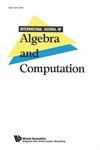环的类群小消去理论
IF 0.5
2区 数学
Q3 MATHEMATICS
International Journal of Algebra and Computation
Pub Date : 2020-10-06
DOI:10.1142/s0218196723500522
引用次数: 2
摘要
本文给出了具有可逆元基的结合代数的一个小消去理论。即研究了自由群的群代数的商,并引入了相应定义关系的三个公理。我们证明了所得到的环是非平凡的。此外,我们还证明了该环具有符合关系的全局过滤,找到了环的一个基作为向量空间,并建立了相应的结构定理。我们还修正了环的Grobner基的概念,并建立了理想隶属度问题的贪心算法。本文章由计算机程序翻译,如有差异,请以英文原文为准。
Group-like Small Cancellation Theory for Rings
In the present paper we develop a small cancellation theory for associative algebras with a basis of invertible elements. Namely, we study quotients of a group algebra of a free group and introduce three axioms for the corresponding defining relations. We show that the obtained ring is non-trivial. Moreover, we show that this ring enjoys a global filtration that agrees with relations, find a basis of the ring as a vector space and establish the corresponding structure theorems. We also provide a revision of a concept of Grobner basis for our rings and establish a greedy algorithm for the Ideal Membership Problem.
求助全文
通过发布文献求助,成功后即可免费获取论文全文。
去求助
来源期刊
CiteScore
1.20
自引率
12.50%
发文量
66
审稿时长
6-12 weeks
期刊介绍:
The International Journal of Algebra and Computation publishes high quality original research papers in combinatorial, algorithmic and computational aspects of algebra (including combinatorial and geometric group theory and semigroup theory, algorithmic aspects of universal algebra, computational and algorithmic commutative algebra, probabilistic models related to algebraic structures, random algebraic structures), and gives a preference to papers in the areas of mathematics represented by the editorial board.

 求助内容:
求助内容: 应助结果提醒方式:
应助结果提醒方式:


